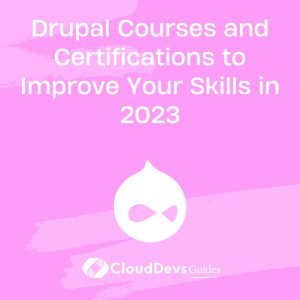Drupal Courses and Certifications to Improve Your Skills in 2023
Drupal has solidified its position as a prominent content management system (CMS), serving a diverse array of online businesses and gaining widespread acceptance among enterprises of various scales. It provides developers with robust features for constructing resilient web applications, resulting in an increasing need for proficient Drupal developers.
Table of Contents
If you are eager to enhance your Drupal skills or pursue a career in Drupal development, exploring certification programs or enrolling in relevant courses can provide substantial advantages. In this article, we will explore some of the top Drupal certification options and courses available in 2023.
1. Drupal Tutorial: Drupal 8 Beginner to Advanced in 8 Projects on Udemy
Drupal Tutorial: Drupal 8 Beginner to Advanced in 8 Projects: This course is designed for beginners and advanced learners who want to learn Drupal 8 from scratch. The course includes eight real-life projects, assignments, tips, tricks, and pitfalls. The course is priced at $84.99 and has a rating of 4.5 out of 5 stars. The course creator is Srikanth Shirodkar.
This course includes 18 sections, with a total of 79 lectures.
- Introduction to CMS and Welcome: In this section, you will learn the fundamentals of Content Management Systems (CMS) and receive a warm welcome, gaining an overview of their pivotal role in web development.
- Drupal 8 Super Easy Installation: This topic will teach you the seamless process of installing Drupal 8, providing the foundation for your exploration into Drupal web development.
- Assignment #1 – Classic Brochure Website: You will learn to apply foundational concepts in creating a classic brochure website with Drupal 8, showcasing effective content presentation.
- Content Management Essentials: In this section, you will learn the essentials of content management in Drupal, exploring tools and techniques for efficient organization and publication of digital content.
- Project 2 – Beginner-Level Blog Site: This topic will teach you to apply your knowledge in creating a beginner-level blog site, gaining hands-on experience in content creation and management within Drupal.
- User Management with Drupal: You will learn to administer user roles, permissions, and authentication for a secure and personalized web environment using Drupal’s user management features.
- Project 3 – Simple Level Internet Forum: In this section, you will learn to apply Drupal’s user management capabilities to create a simple-level internet forum, fostering interactive online communities.
- Powerful Themes: This topic will teach you to leverage Drupal’s powerful theming capabilities, allowing you to customize the visual appearance of your website according to your brand or project.
- Project 4 – Simple Level Using Themes: You will learn to apply your understanding of Drupal themes by creating a simple-level website with a customized visual identity.
- Magic of Taxonomy: In this section, you will learn the magic of Drupal’s taxonomy system, understanding how to categorize and organize content effectively for improved navigation and user experience.
- Project 5 – Intermediate-Level Recipe Website: You will learn to apply taxonomy concepts in building an intermediate-level recipe website, showcasing structured content organization.
- Drupal Content Types – The Flexible Solution: This topic will teach you about the flexibility offered by Drupal’s content types, providing a versatile solution for various content structures and formats.
- Project 6 – Intermediate-Level Film Review Site: You will learn to apply your knowledge by building an intermediate-level film review site, demonstrating the flexibility of Drupal’s content types.
- Magical Drupal Blocks: In this section, you will learn to leverage Drupal blocks, applying them as modular units for dynamic content presentation and layout customization.
- Project 7 – Intermediate Level – News Magazine Website: You will learn to apply Drupal blocks in creating an intermediate-level news magazine website, implementing dynamic and engaging layouts.
- Drupal Modules in Depth: You will learn in-depth about Drupal modules, understanding how to extend and enhance the functionality of your Drupal website to meet specific requirements.
- Project 8 – Advanced Level: Simple eCommerce Site: This topic will teach you to apply advanced Drupal modules in creating a simple eCommerce site, demonstrating enhanced functionality.
- Powerful Drupal 8 Views: In this section, you will learn to create and customize dynamic lists and grids using Drupal 8 Views, mastering the power of this feature for presenting content in various formats.
By the end of this Drupal course, you will receive a certificate of completion.
2. Drupal Developer Essentials on Udemy
Drupal Developer Essentials is designed to provide developers with the essential skills and knowledge required to work effectively with Drupal. This course covers a range of critical tools and best practices, with a focus on Composer, Git, CLI tools, and debugging techniques. The course creator is Van Looveren Stef.
The course modules are;
- Composer, GIT, and CLI Tools: In this section, you will learn to harness the power of Composer, GIT, and CLI tools for effective Drupal development, gaining proficiency in essential tools for version control and dependency management.
- Debugging Setup and Tools in Drupal: This topic will teach you to set up and utilize debugging tools in Drupal, empowering you to troubleshoot and optimize your code effectively.
- Configuration Management: In this section, you will delve into Drupal’s configuration management, learning how to efficiently handle and synchronize configuration settings across various environments.
- Bonus Lecture: This concluding lecture will offer additional insights, tips, or advanced concepts related to Drupal development, providing a bonus layer of knowledge beyond the core topics.
By the end of this course, you will learn composer and its essential commands, utilize debugging and profiling tools, and understand how to apply Git best practices for Drupal
Here is a comparison table of the Drupal courses and certifications mentioned above.
3. Drupal 8: Under the Hood on Symfonycasts
‘Drupal 8: Under the Hood’ is a comprehensive video tutorial on Symfonycasts. The tutorial is built using Drupal 8.0 and is designed to help Drupal 7 developers understand the new concepts, paradigms, terms, and patterns in Drupal 8. The tutorial covers topics such as installation, modules, routes, controllers, debugging, web profiler, service container, event subscribers, dependency injection tags, and more. The course is taught by Ryan Weaver.
The course modules are;
- Installation: In this section, you will learn the step-by-step process of installing Drupal, setting the groundwork for your exploration into Drupal web development.
- The Drupal Console and Route Cache: This topic will introduce you to the Drupal Console, a powerful command-line interface, and guide you through using Route Cache for optimizing route handling.
- Routing Wildcards: You will learn to handle routing wildcards in Drupal, and understand how to manage dynamic URL patterns for flexible and personalized web applications.
- Debugging: In this section, you will learn essential debugging techniques for Drupal, gaining insights into identifying and resolving issues in your web development projects.
- The Webprofiler: Explore the Drupal Webprofiler, understanding how to use this tool for in-depth profiling and performance optimization of your Drupal applications.
- What is the Service Container?: This topic will teach you the fundamental concept of the Service Container in Drupal, a key component for managing and organizing services in the application.
- Create A Service: In this section, you will learn to create a custom service in Drupal, leveraging the Service Container to encapsulate and reuse functionality across your application.
- Configuring a New Service: You will learn to configure a new service in Drupal, understanding how to define service parameters and dependencies for seamless integration into your application.
- The Magic Behind Shortcuts Methods is: Services: Understand the magic behind shortcut methods in Drupal, realizing the underlying role of services in providing convenient and efficient functionality.
- Service Arguments: This topic will teach you how to work with service arguments in Drupal, and understand how to pass parameters and values to services for dynamic behavior.
- Configuration Parameters: Explore Drupal’s configuration parameters, learning how to manage and utilize these settings to customize the behavior of your Drupal application.
- Overriding Core Drupal: Learn the techniques for overriding core functionality in Drupal, allowing you to tailor the platform to meet specific project requirements.
- Drupal Events Versus Hooks: Understand the distinction between Drupal events and hooks, gaining insights into how these mechanisms facilitate extensibility and customization in Drupal.
- Event Subscribers and Dependency Injection Tags: Learn about event subscribers in Drupal, and how to use dependency injection tags for efficient handling of events in your application.
- Event Arguments and the Request: This section will teach you how to work with event arguments and the request object in Drupal, enabling you to respond dynamically to events triggered within your application.
- The Render Array… and Event Listeners: Explore the render array in Drupal and understand the role of event listeners in managing and modifying the rendering process for enhanced customization.
You can receive a certificate by the end of this course and also start attempting the next course of this series Drupal 8: Dive into D8 track course.
4. Introduction to Drupal by DrupalTutor
Introduction to Drupal is a beginner’s Drupal certificate course delivered by DrupalTutor. This beginner-level course is designed to help you learn the basics of Drupal, a powerful content management system. The course is suitable for anyone who uses a Drupal website, regardless of their experience with Drupal or web development.
The course modules are;
- Introduction: In this section, you will receive an introduction to Drupal, understanding its core concepts and the role it plays in web development.
- Installing Drupal: This topic will guide you through the installation process of Drupal, ensuring a seamless setup for your web development environment.
- Content Administration: You will learn how to administer content effectively in Drupal, covering content creation, organization, and management for a dynamic website.
- User Administration: Explore the user administration features in Drupal, learning how to manage user roles, permissions, and authentication for a secure and personalized user experience.
- Other Configuration: In this section, you will learn about various other configurations in Drupal, understanding how to optimize settings for your specific web development needs.
- Managing Modules: Learn to manage modules in Drupal, exploring the vast array of contributed and custom modules to enhance the functionality of your website.
- Customizing the Design and Layout: This topic will teach you how to customize the design and layout of your Drupal website, utilizing themes and layout tools for a visually appealing presentation.
- Website Maintenance: Understand the essentials of website maintenance in Drupal, covering updates, backups, and other tasks to ensure the ongoing health and performance of your website.
- Class Wrap-Up: Concluding the class, you will reflect on the key concepts covered in the Drupal course, preparing you for further exploration and application of Drupal in your web development projects.
Since this course includes 4 live webinars with the instructor, you can share your questions, doubts, and any Drupal programming issues and get them solved in the real-time webinar event.
Here, we have added a comparison table for all the Drupal courses mentioned above in this article.
| Drupal Tutorial: Drupal 8 beginner to Advanced in 8 Projects | $64.99 | Intermediate / Advanced | 7.5 hours | Online |
|---|---|---|---|---|
| Drupal Developer Essentials | $19.99 | Intermediate / Advanced | 2 hours 41 minutes | Online |
| Drupal 8: Under the Hood | $19.99 | Beginner / Intermediate / Advanced | 1 hour and 11 minutes | Online |
| Introduction to Drupal | $98 | Beginner | 5+ hours | Online |
The presented table demonstrates variances in Drupal courses, encompassing duration, costs, and prerequisite skills. Course fees are contingent on factors such as the learning platform, study format, and duration. When selecting a Drupal course, it is imperative to assess your skills, financial considerations, and career objectives. This methodology assists in pinpointing the most suitable Drupal course tailored to your specific needs.
Conclusion
To summarize, enrolling in a Drupal course in 2023 provides a valuable avenue for career advancement. Through effective training, you can refine your skills as a Drupal developer and participate in stimulating projects. Whether you are a beginner developer or a seasoned professional, there exists a plof courses and certification programs to enhance your proficiency in Drupal development.
Table of Contents






